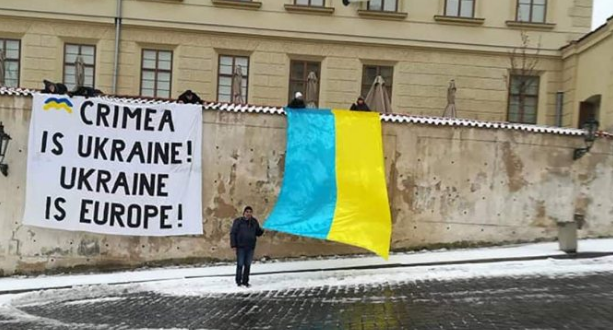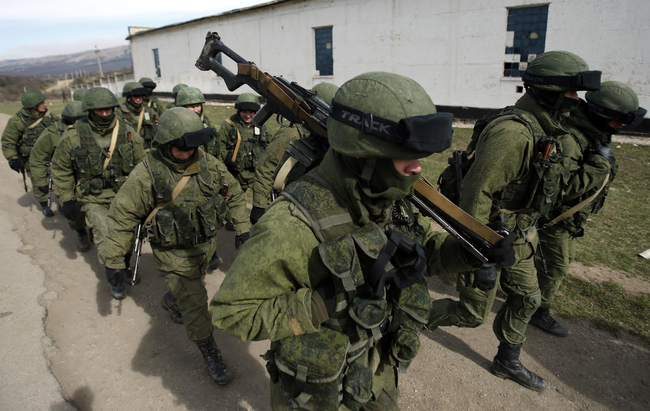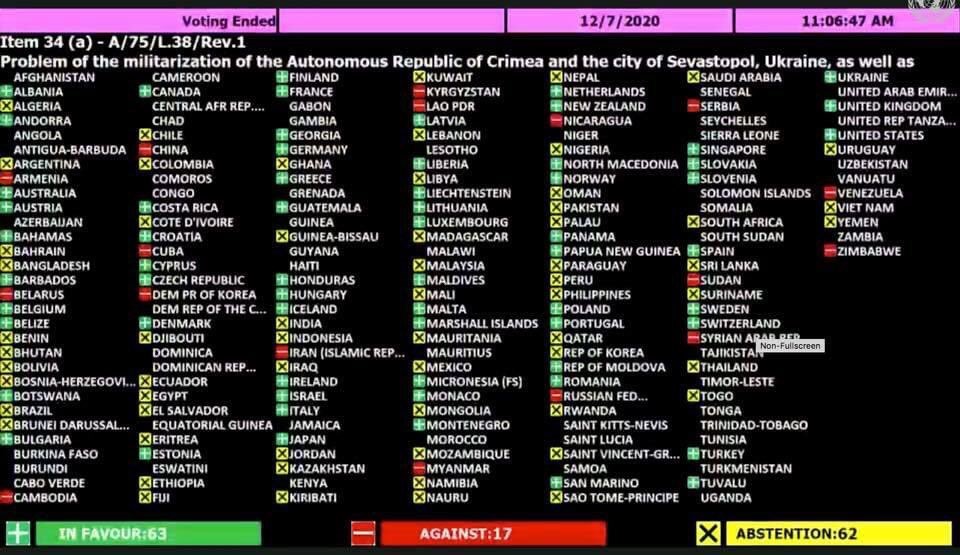However, Ukraine has not had actual control over Crimea since the end of February 2014, and this fact is confirmed by Ukrainian legislation and the decision of the European Court of Human Rights (January 14, 2021).
Today, the question is straightforward: how should we - Ukraine, the international community, Western partners, the media - refer to Crimea, so that there is no doubt that it is an integral part of Ukraine?
The answer, however, is not so straightforward. Which terms are correct and “safe” to use? What do western countries and international structures call Russia’s aggression against Crimea? How is it mentioned in the judicial cases won by Ukraine in international courts?
We will provide the answers to these questions and detailed explanations. But first, how to correctly name the consequences of Russian aggression and what terms should not be used.
Occupation and Annexation
Under Ukrainian law and international law, Crimea is an occupied territory, and accordingly, Russia is an occupying power, and as such, it is bound by a range of specific obligations.
Furthermore, no one can deny that Russia is also: 1) an aggressor state; 2) an occupying power; and 3) a state violating international law. All three terms are used in official documents, and all are correct, whether they are used for Crimea or the occupied territories of the Donbas.
De facto, it is entirely correct to refer to the present authorities in Crimea as an ‘occupying administration’ or ‘occupying authorities’.
‘Annexation’ means acquiring territory by force and is a flagrant violation of international law. As such it can have no effect on the legal status of the territory, which remains de jure occupied.
Thus, the purported annexation of Crimea does not change the status of Crimea as an occupied territory. Crimea remains under the control of Russian forces and Russian authorities without the consent of Ukraine.
The term ‘illegal annexation’ is the most accurate and the most common in international documents and in official statements issued by Ukraine’s Western partners.
Important detail
When speaking or writing about the Russian occupation of Crimea, it is advisable to underline the occupation and annexation of the ‘Autonomous Republic of Crimea and the city of Sevastopol’. However, this phrase is very long and awkward, and it can be abbreviated to ‘Crimea’ or the ‘Crimean Peninsula’. This does not undermine Ukraine’s position.
But, the phrase ‘Republic of Crimea’ must not be used as it was introduced by the Russian occupying administration.
Why is terminology so important?
In a nutshell:
- the first armed aggression instigated by the Russian Federation took place in February 2014;
- Russian forces, disguised as ‘little green men’ occupied Crimea, but this took place in several stages and continues to this day;
- then came the so-called referendum, followed by an officially proclaimed ‘annexation’ in violation of international law;
- since that day in March 2014, Russia has been striving to legitimize this annexation.
First, the actual terminology should be understood.
Occupation
Occupation is a legal status and its international recognition is extremely important for Ukraine in the struggle for the liberation of Crimea and the occupied territories of the Donbas.

Under the law of occupation, an occupation is supposed to be temporary and does not alter the status of the territory in question. The law of military occupation applies to the occupied territory of Crimea. The occupying power – the Russian Federation - does not enjoy sovereign rights over the territory in question and is bound by obligations. For example, in this case, Russia, as the occupying power, must supply water to Crimea. This is clearly defined and regulated by international humanitarian law, i.e. a set of norms and conventions that define the so-called ‘laws and customs of war’, restrictions imposed on the occupying power, etc. The law of military occupation is set forth in the Fourth Geneva Convention of 1949, and the 1977 Additional Protocol I applicable to international armed conflicts. Both Russia and Ukraine are parties to the 1977 Additional Protocol I. Conscious gross violations of the laws or customs of war are international crimes punishable, inter alia, by the International Criminal Court in The Hague.
Aggression
Aggression is an international crime, as defined by the UN General Assembly in Resolution No.3314 of 1974.
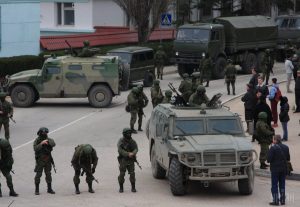
The resolution identifies seven types of aggression and a number of subtypes of actions perpetrated by one state against another, each of which is a sign that the first state is committing a crime of aggression. These include as follows:
- armed invasions or attacks;
- military occupation;
- bombardments or the use of any weapons by a State against the territory of another State;
- forced annexation of the territory of a State;
- sending armed bands, groups or mercenaries, which carry out armed aggression on the territory of a State on behalf of another State;
- blockade of ports and coastal waters by another State, as well as attacks on warships;
- use of military forces stationed on the territory of the receiving State under an interstate agreement, in contravention of the terms and conditions provided for in this agreement.
The above are separate components of the crime of aggression committed by the Russian Federation in Crimea and the Donbas, each of which underscores the responsibility of the Russian Federation. It should be noted that the recognition of aggression does not depend on whether a war has been declared, an important fact in the context of the conflict between Russia and Ukraine.
Annexation
Annexation is the administrative action and concept in international law relating to the forcible acquisition of one state’s territory by another state and is generally held to be an illegal act (see General Assembly Resolution 3314 (XXIX), with the Definition of Aggression annexed to it, adopted on 14 December 1974. Russia illegally annexed Crimea and incorporated the Autonomous Republic of Crimea and the city of Sevastopol as two federal subjects of the Russian Federation on 18 March 2014.
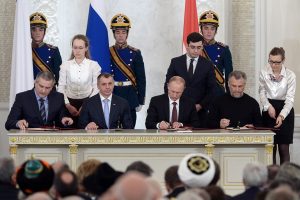
Currently, there is no convention or international agreement stipulating penalties for annexation, nor is there a clear definition of the crime; debate is still ongoing. However, international institutions agree that the crime of annexation does not mean a change in sovereignty over the annexed territory.
Therefore, annexed Crimea remains Ukrainian and will retain this status as long as the Ukrainian government calls it so. This is underscored, for example, in the ICRC’s commentary on the Fourth Geneva Convention, whereby it is “groundless” to assume that a statement of annexation “legalizes” its consequences.
Besides the annexation of Crimea, there are a number of aggressions in the world, which are listed as ‘annexations’ in international documents - for example, Israel’s de facto annexation of the Golan Heights. There have been cases where international pressure has forced the occupying state to abandon annexation – for example, East Timor, which was annexed by Indonesia in 1976, and regained its independence in 2002.
Therefore, annexation does not change the two international legal regimes that apply to the Autonomous Republic of Crimea and the city of Sevastopol. The situation is primarily governed by both international humanitarian law (including the rules of the law of occupation) and international human rights law. International criminal law is also relevant as some serious violations may constitute war crimes or crimes against humanity.
Major international decisions in the case of Ukraine v. Russia re Crimea
The above arguments are not new and well known to international lawyers, but even in the seventh year of Russian aggression, there are still many myths about how we - the media, society, politicians, international partners - should refer to Russia’s aggression in Crimea.
At the beginning of the year, Ukraine won a very important - albeit formally intermediate - victory on the international stage. The European Court of Human Rights became the first international court to recognize that Russia occupied the Crimean peninsula in February 2014. This decision confirms the absolute illegality and nullity of the fake ‘referendum’, which was held under the control of the Russian occupying authorities.
Ukraine’s application to the ECtHR constantly mentions ‘annexation and occupation’. This is public information, as the Court extensively cites Ukraine’s application in its decision.
Even though the ECtHR did not formally consider the issue of annexation (this is not within its competence), it is the annexation, i.e. Russia’s illegal de facto takeover of power in Crimea, that was one of the key grounds for the Court to rule on Russia’s responsibility for further human rights violations in Crimea.
‘Occupation and annexation’ are also clearly mentioned in Ukraine’s memorial submitted to the UN International Court of Justice regarding Russia’s violation of two conventions (see judgment of 8 November, 2019) 10
As to Ukraine’s Western partners, the vast majority, including the European Union and its member-countries, Britain, Canada, etc., have from the outset referred to Russia’s actions as ‘occupation, annexation’ and even ‘illegal annexation’, and they do not intend to change this terminology because it is legally correct.
It should be noted that the United States – in the case of Crimea - has chosen an alternative, but also safe official term – ‘attempted annexation’. This was not an American initiative, but a request submitted by Ukraine. Nevertheless, in the resolutions issued by the UN General Assembly, both versions are used.
Of course, the only state that opposes the word ‘annexation’ is the Russian Federation.
Conclusion
Russia is an aggressor state, which has committed several international crimes, one of which is the annexation of Crimea, the legal consequences of which are not recognized by either Ukraine or the international community. Although it is very important for Ukraine that the occupation of Crimea is listed among the crimes of the Russian Federation as it establishes Russia’s legal responsibility for what is happening in Crimea, it does not annul other actions perpetrated by Russia.
In view of this, when describing events in Crimea, it is very important to underline that the peninsula is occupied. The Ukrainian government (Ministry of Foreign Affairs, Ministry of Transport, etc.) should develop a single ‘dictionary’ regarding Crimea and adhere to unified wording.
However, journalists, experts, foreign politicians have more choice, because there are several other legal formulations that are quite safe, are widely used by Ukraine’s partners and do not undermine the position of Ukraine.
 Serhiy Sydorenko is the editor of Evropeyska Pravda. The author expresses his gratitude to international lawyers Oleksandr Marusyak, Mykola Yurlov, as well as numerous representatives of government agencies and the legal community for their advice and assistance in the preparation of this text.
Serhiy Sydorenko is the editor of Evropeyska Pravda. The author expresses his gratitude to international lawyers Oleksandr Marusyak, Mykola Yurlov, as well as numerous representatives of government agencies and the legal community for their advice and assistance in the preparation of this text.

